Archbishop Viganò responds to 'excommunication': 'If we had a pope...'
'In thy Blood': Archbishop Viganò issues his response to the Vatican's declaration of his 'excommunication' for the delict of 'schism.'

Editors’ Notes
On July 2024, Archbishop Carlo Maria Viganò was declared by the Vatican to have been automatically excommunicated for the delict of schism.
Following Vatican’s decree of automatic excommunication for the supposed delict of schism, Archbishop Carlo Maria Viganò has issued a statement in the form of a sermon. The statement is dated 7 July 2024, but was published on 16 July 2024.
Before proceeding to his text, let’s note that putative authorities who teach heresies have no power to excommunicate Catholics who refuse to accept their errors – whether the reason is that these putative authorities are heretics themselves, or have already lost office or not.
This was taught directly by Pope St Celestine, in reference to those who were deposed or excommunicated for failing to accept the errors of Nestorius. St Robert Bellarmine cites these letters (whilst indicating that this is indeed because they lost office ipso facto):
“It is evident that he [who has been excommunicated by Nestorius] has remained and remains in communion with us, and that we do not consider destituted [i.e. deprived of office, by judgment of Nestorius], anyone who has been excommunicated or deprived of his charge, either episcopal or clerical, by Bishop Nestorius or by the others who followed him, after they commenced preaching heresy. For he who had already shown himself as deserving to be excommunicated, could not excommunicate anyone by his sentence.”
And:
“The authority of Our Apostolic See has determined that the bishop, cleric, or simple Christian who had been deposed or excommunicated by Nestorius or his followers, after the latter began to preach heresy, shall not be considered deposed or excommunicated. For he who had defected from the faith with such preachings, cannot depose or remove anyone whatsoever.”1
In another work, Bellarmine refers back to these texts, and adds:
“The fact is likewise confirmed from the canon Audivimus, 24, quaest. 1, where we read: ‘But if he will have devised a new heresy in their heart, to the extent that he begins to preach such things, he can condemn no man.’”2
As such, even if one thinks Francis has somehow have retained his office, the errors which he has preached should indicate the value of the excommunication declared against Archbishop Viganò.
These points are discussed further here:
What Happened
Viganò was declared by the Vatican to have been automatically excommunicated for the delict of schism. The decree stated:
On 4 July 2024, the Congress of the Dicastery for the Doctrine of the Faith met to conclude the extrajudicial penal process referred to in canon 1720 CIC against the Most Reverend Carlo Maria Viganò, titular Archbishop of Ulpiana, accused of the reserved delict of schism (canons 751 and 1364 CIC; art. 2 SST).
His public statements manifesting his refusal to recognize and submit to the Supreme Pontiff, his rejection of communion with the members of the Church subject to him, and of the legitimacy and magisterial authority of the Second Vatican Council are well known.
At the conclusion of the penal process, the Most Reverend Carlo Maria Viganò was found guilty of the reserved delict of schism.
The Dicastery declared the latae sententiae excommunication in accordance with canon 1364 § 1 CIC. The lifting of the censure in these cases is reserved to the Apostolic See. This decision was communicated to the Most Reverend Viganò on 5 July 2024.
The comment “refusal to recognize and submit to the Supreme Pontiff” in the decree may not only refer to Viganò: it may also be an allusion to the position labelled as “Recognise and Resist,” namely that one can recognise a man as the Roman Pontiff, whilst resisting his universal teaching and disciplinary laws.
In other words, by citing Viganò’s alleged failure to “recognize and submit” to the (alleged) Roman Pontiff, this may be sending a warning shot to those who also fail to “recognize and submit” to him through their embrace of a “Recognise and Resist” position.
Alternatively, it may be an indication of the opposite: that the Conciliar-Synodal Church will accept all manner of resistance, so long as the “resisters” still profess to recognise its legitimacy and that of its alleged popes.
Viganò himself appeared to condemn this position in his counter-accusation of June 28:
Is it possible then that the Church has begun to teach error? Can we believe that the one Ark of salvation is at the same time also an instrument of perdition for souls? That the Mystical Body separates itself from its Divine Head, Jesus Christ, making the Savior’s promise fail? This cannot, of course, be admissible, and those who support such an idea fall into heresy and schism.
The Church cannot teach error, nor can her Head, the Roman Pontiff, be at the same time heretical and orthodox, Peter and Judas, in communion with all his predecessors and at the same time in schism with them. The only theologically possible answer is that the Conciliar Hierarchy, which proclaims itself Catholic but embraces a faith different from that constantly taught for two thousand years by the Catholic Church, belongs to another entity and therefore does not represent the true Church of Christ.
The excommunication came after his summons to the former Holy Office (now the “Dicastery for the Doctrine of the Faith”) on 20 June. He was accused of:
“public statements which result in a denial of the elements necessary to maintain communion with the Catholic Church; denial of the legitimacy of Pope Francis, rupture of communion with Him, and rejection of the Second Vatican Council.”
The trial was an “extrajudicial process” which is what is followed when sufficient evidence is deemed to have been gathered, such that a judicial trial is unnecessary.
Viganò issued a forceful response to this summons, which contained allusions to Archbishop Marcel Lefebvre and the sedevacantist thesis. You can see this below:
He also issued a counter-accusation of schism and other crimes to Francis here:
Whatever anybody thinks of the matter, this sermon contains many edifying points about the Cross, suffering and the current crisis.
Let us all keep Archbishop Viganò in our prayers.
We have added some links to articles which we believe give some further context to the ideas mentioned by Viganò, as well as some line breaks to make the text easier to read.
IN SANGUINE TUO
Homily on the external Solemnity
of the Most Precious Blood of Our Lord Jesus Christ
Redemisti nos, Domine, in sanguine tuo,
ex omni tribu, et lingua, et populo, et natione:
et fecisti nos Deo nostro regnum. (Rev 5:9-10)
Dear brothers and sisters,
First of all, allow me to share with you my serenity of mind in facing this trial. I experienced the same inner peace when, a few years ago, I rediscovered the Traditional Mass, which since then I have never stopped celebrating exclusively and which has brought me back to the beating heart of our holy Religion, to understand that being united to Christ the Priest in the offering to the eternal Father must necessarily be translated into the mystical immolation of oneself on the model of Christ the Victim, in restoring the divine order in which Charity consumes us with love for God and neighbor, and shows us how incomprehensible – as well as unacceptable – it is to modify anything of this perfect order that the Holy Church anticipates on earth precisely by placing the Cross at the center of everything. Stat Crux dum volvitur orbis.
For sixty years, however, along with the world, volvitur et ecclesia. The ecclesial body has also lost its point of stability: yesterday, in the mad attempt to adapt to the world by softening its doctrine; today, in the deliberate desire to erase the Cross, a sign of contradiction, in order to please the Prince of this world. And in a world hostile to the Cross of Christ, it is not possible to preach Christ, and Christ crucified, because this is “divisive” for a “human brotherhood” from which the fatherhood of God is excluded. It is not surprising, therefore, that those who proclaim the Gospel without adaptations are considered enemies. Christians of all ages, and among them the Pastors in the first place, have always been opposed and fought and killed precisely because of the incompatibility between the Civitas Dei and the civitas Diaboli. The Lord taught us:
“If they have persecuted me, they will persecute you also; if they have kept my word, they will also keep yours” (Jn 15:20).
A few days ago, a church enslaved to the world put me on trial for schism and condemned me with excommunication for having openly professed the Faith that the Lord by my Episcopal Consecration ordered me to preach; the same Faith for which the Martyrs were killed, the Confessors persecuted, priests and Bishops imprisoned or exiled. But how can we even think that it is the true Church that strikes its children and its Ministers, and at the same time welcomes its enemies and makes their errors its own? This Church, which calls itself “conciliar and synodal,” is a counterfeit, a counter-church, for which everything begins and ends in this life, and which does not want to accept anything eternal precisely because the immutability of the Truth of God is intrinsically alien to the permanent revolution that it has welcomed and promotes.
If we were not persecuted by those who are hostile to the Cross, we would have to question our fidelity to Christ, who from that Throne of pain and blood struck a mortal blow against the Enemy of the human race. If our Ministry could be “tolerated” in some way, it would mean that it is ineffective and compromised, if only because of the implicit acceptance of an impossible coexistence between opposites, of a hermeneutic of continuity in which there is room for truth and error, light and darkness, God and Belial. That is why I consider this sentence of the Roman Sanhedrin as causing clarity: a Catholic cannot but be in a state of schism with those who refuse the Profession of Faith in Charity. There can be no communion with the one who first broke the supernatural bond with Christ and with His Mystical Body. Nor can there be obedience and submission to an adulterated version of the Papacy in which authority has deliberately withdrawn from Christ, the first principle of that authority, to be transformed into tyranny.
Thus, just as in the morally necessary choice to return to the Apostolic Mass I rediscovered the true meaning of my priesthood, so too in the decision to denounce the apostasy of the modernist and globalist hierarchy I rediscovered the meaning of my Episcopate, of being a Successor of the Apostles, a witness of Christ and a Pastor in His Church.
Timidity, human respect, opportunistic evaluations, thirst for power, or corruption have led many of my Brothers to make the simplest choice: to leave the Lord by Himself in His Passion and mingle with the crowd of His executioners, or even just to stand by for fear of going against the high priests and scribes of the people. Some of them, like Peter, repeat the “I do not know Him” so as not to be brought before the same Sanhedrin. Others stay closed in their cenacle, content not to be tried and condemned. But is this what the Lord wants of us? Is this what He has called us to in choosing us as His Ministers and as proclaimers of His Gospel?
Dear brothers, bless these times of tribulation with me, because it is only in infirmitate that we have the certainty of fulfilling God’s Will and sanctifying ourselves with His Grace. As Saint Paul says:
My grace is sufficient for you, for my power is made perfect in weakness (2 Cor 12:9).
Our being docile instruments in the Lord’s hands is the indispensable premise for ensuring that His work is truly divine.
We are asked only to follow him: Veni, et sequere me (Mt 10:21); to follow Him leaving everything else, which is to make a radical choice. We are asked to preach His Gospel, to baptize all nations in the name of the Father and of the Son and of the Holy Spirit, to keep faithfully all the precepts that the Lord has commanded us to observe (Mt 28:19-20). We are asked to pass on intact what we have received – tradidi quod et accepi – without additions, without changes, without omissions. And to preach the Word opportune, importune, enduring everything: in omni patientia et doctrina (2 Tim 4:2). We are asked to take up our cross every day, to deny ourselves, to be ready to climb Calvary and be crucified with Christ to rise with Him, to share in His victory and triumph in the blessed eternity of Heaven. We are asked to complete in our flesh what is lacking in Christ’s afflictions, for the good of his Body which is the Church (Col 1:24). Pastors need to return to belonging to Christ, shaking off the oppressive yoke of a servitude to the world that makes them accomplices in the ruin of the Church.
From the Most Sacred Heart, pierced by a spear, flows the infinite Grace of the Sacraments and especially of the Catholic Priesthood. It ensures the perpetuation of Christ’s redemptive action throughout History, so that the perfect Sacrifice of the divine Victim – who entered the Sanctuary once and for all through his own blood (Heb 9:12) – may continue to be offered under the sacramental species to the Eternal Father. In the same way, when the Church appears defeated and is given up for dead, a spear in Her side renews the flow of blood and water, laying the foundation for a future restoration and guaranteeing the preservation of the Priesthood, the Mass, and the Sacraments: of Tradition. It will be that blood and water that will irrigate this land parched and split by drought, thirsty for the True and the Good, so that the semen Christianorum may sprout and bear fruit.
Beware of false prophets, who come to you in the form of sheep, but who inwardly are ravenous wolves (Mt 7:15). With these words, significantly proposed by the Liturgy of this Seventh Sunday after Pentecost and which we will read in the last Gospel, the Lord warns us against those who usurp the gift of prophecy in order to contradict the Faith that he revealed and taught the Apostles so that it might be faithfully handed down the centuries.
The Lord does not say: Beware of those who sow error, but of false prophets. Who are these false prophets, these pseudochrists of whom Sacred Scripture speaks? For false Christs and false prophets will arise and perform great portents and miracles, so as to mislead even the elect if possible. Behold, I have foretold it to you (Mt 24:24-25). These are the hirelings, the false shepherds, those whom we can recognize ex fructibus eorum, by their fruits, by what they do (Mt 7:16-20). We know the fruits and we have them before our eyes: the planned destruction of the Lord’s Vineyard by His own vinedressers.
What is imputed to me as a crime in order to declare me schismatic and condemn me to excommunication has been put on the record of a trial that condemns not me, but my accusers, the enemies of the Cross of Christ. When the eclipse that darkens the Church ends and Our Lord returns to be at the center of the lives of his ministers, those who are ostracized today will find justice, and those who have abused their power to disperse the Lord’s flock will have to answer to His tribunal and to that of History. We will continue to do what all Catholic Bishops have done, often being persecuted by them.
And we will continue in our work even if it is hindered by those who usurp the power of the Holy Keys against the Church Herself. The authority of the Pastors – and that of the Supreme Pontiff – is in the hands of false pastors, who as such count precisely on our respect for the Hierarchy and on our habitual obedience to make us accept the betrayal of Christ and the ruin of souls.
But authority comes only from Christ, who wants all to be saved and to reach eternal blessedness through the one Ark of Salvation. If the vicarious authority on earth preaches salvation from false religions and the uselessness of Christ’s Sacrifice, it breaks the umbilical cord that binds it to Him, thereby delegitimizing itself. We do not separate ourselves from Holy Mother Church, but rather from the mercenaries who infest her. We do not refuse obedience and submission to the Pontiff, but rather to those who humiliate and tamper with the Papacy against the Will of Christ.
Let us not impugn the revealed Truth – quod Deus avertat! – but rather the errors that all the Popes have always condemned and that today are imposed by those who want to make the Holy Church the servant of her enemies (Lam 1:1), by those who delude themselves that they can keep the ecclesial body alive by separating it from its Head who is Christ.
We do not have a Pontiff who can judge and excommunicate us. If there were a Pope I would not even have been put on trial, nor excommunicated or declared schismatic, because we would both profess the same Faith and would receive Communion at the same altar. If today Bergoglio is putting me on trial to condemn and excommunicate me, it is precisely because he makes a public profession that he belongs to another religion and that he presides over another church – his church, the synodal church – from which I am “expelled” because I am a Catholic and, indeed, a stranger to it.
Pray, dear brothers. Pray first of all for the faithful and the ministers who live the contradiction of moral belonging to the true Church of Christ and at the same time belonging to the false church of the usurper Bergoglio, so that they may shake themselves from their torpor and line up underneath the Cross, bearing witness to the Truth. Pray for those Bishops and priests who humbly, and despite their infirmities, serve the Lord. Let us not nullify the Most Precious Blood that he shed for us, and indeed let us make sure that we can repeat with Saint Paul: Gratia Dei in me vacua non fuit (1 Cor 15:10). This Blood will descend today on our altar, and it will continue to descend there as long as the Church has Bishops who can perpetuate the Priesthood and priests who celebrate the Holy Sacrifice, according to the rite handed down to us by Sacred Tradition. For this reason, let us act with a serene heart and in the conviction that what I am doing is in conformity with God’s will. And so may it be.
+ Carlo Maria Viganò, Archbishop
July 7, 2024
Dominica VII post Pentecosten
At this time, the following articles are essential reading.
HELP KEEP THE WM REVIEW ONLINE!
As we expand The WM Review we would like to keep providing free articles for everyone. If you have benefitted from our content please do consider supporting us financially.
A subscription from you helps ensure that we can keep writing and sharing free material for all.
Plus, you will get access to our exclusive members-only material!
Thank you!
St. Robert Bellarmine, De Romano Pontifice, lib. II, cap. 30, trans. James Larrabee. Quoting Pope St Celestine epist. ad Jo. Antioch., which appears in Conc. Ephes., tom. I, cap. 19; St Nicholas I epist. ad Michael, and St Thomas Aquinas S. Theol., II-II, q. 39, a. 3.
Latin and Greek of St Celestine available here.
St Robert Bellarmine, from De Controversiis: Tomus II, On the Church Vol. I, Book III (On the Church Militant), Ch. X, Secret Infidels. Trans. Ryan Grant, Mediatrix Press, Post Falls ID, 2017, p 295.

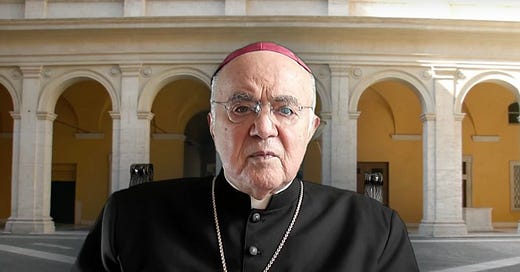

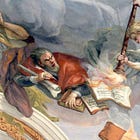
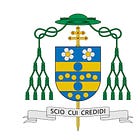

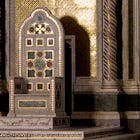

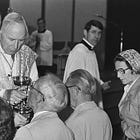
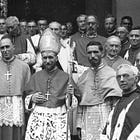
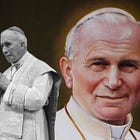

Reading this and I can't help but think +Vigano is saying that he was conditionally consecrated by Bishop Williamson, and that was because, by celebrating the Church's liturgy in it's pure and proper form, he understood that something was off.